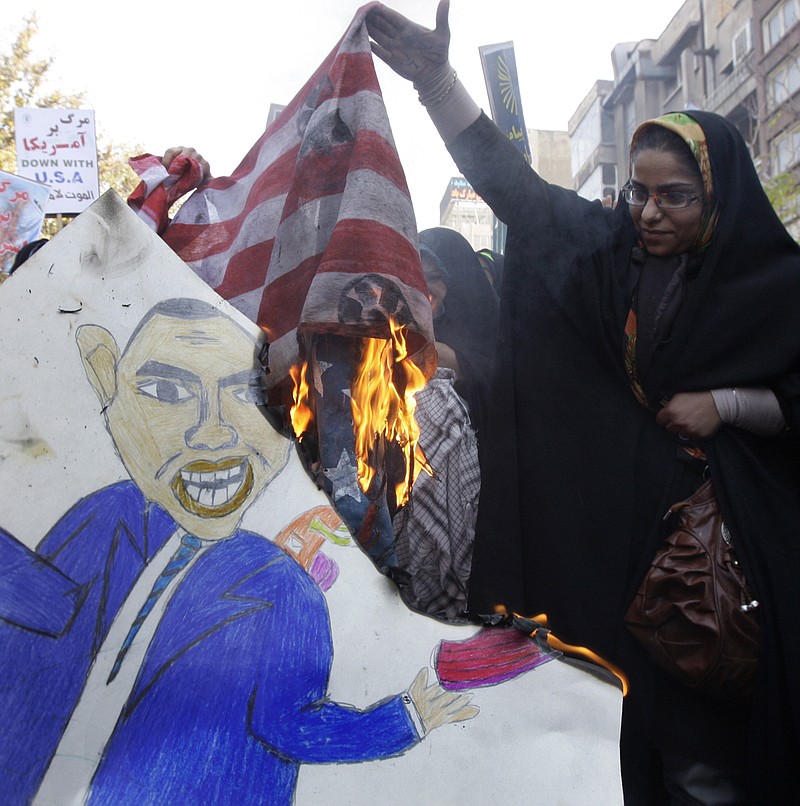Forty years ago tomorrow, militant Islamists seized the United States embassy in Tehran, Iran, and began the start of what President Donald Trump has categorized generally as "endless wars."
For those not around at the time, the 1979 seizure, kidnapping and imprisonment of what at first was 66 American hostages was unlike anything the country had experienced. Yes, the country was only four years out of the Vietnam War, and, yes, it had seen several hundred skyjackings during the decade, but this was something entirely new and fearful.
And it occurred in a country that until that year was Westernizing and had been a U.S. friend and ally.
Since then, the U.S. in the Middle East region has endured, among other things, two 1983 bombings in Lebanon that killed more than 300 Americans, the 1991 Iraq war following Iraq's invasion of Kuwait, early 1990s attacks on Americans in Somalia led in part by Saudi exile Osama bin Laden, the Sept. 11, 2001, attacks on New York and Washington, D.C., wars in Iraq and Afghanistan, and battles against the Islamic State caliphate in Iraq and Syria over the last five years.
For some, perhaps including - depending on the day - Trump, the 40 years of "endless wars" should be enough to end all U.S. activity in that corner of the world.
Like many, we tire of hearing our military suffer casualties in another country and of seeing our diplomats get wound up in the geopolitical dramas of other regions. But we also recognize that, unlike the days when the enemy was a destructive Nazi regime or even a territory-annexing communist power, the war against militant Islamists is not taking place in one country and not even on one continent. It will not end with one cease-fire or one document of peace.
And we fight (or try to keep the peace) elsewhere so we do not have to have to fight in the United States.
We've seen the need for that presence as recently as late last month when, shortly after Trump removed some peacekeeping troops from Northern Syria, U.S. special forces cornered Islamic State leader Abu Bakr al-Baghdadi in the same area before he killed himself with explosives.
It is because of that uncertainty of enemy and because of our homeland that we can never abandon involvement abroad. It doesn't mean we need to fight endless ground wars, but it does mean we need to assist those fighting for freedom, to find compromise where possible and to help negotiate for peace.
The seizing of the hostages on Nov. 4, 1979, was said at the time to be a retaliation for the U.S. allowing the former Iranian leader, Shah Mohammad Reza Pahlavi, to come here for medical treatment (before he died in Egypt on July 27, 1980). That reason, though, only papered over a much older grudge against the U.S. by revolutionaries, who held the U.S. responsible for the shah's installation as Iran leader in 1953.
Iran, since then, has become the world's leading exporter of terror and a divisive but large cog in the Middle East.
But in November 1979, the ongoing hostage crisis piqued Americans' interest. Four days after the seizure, and because it was a third-place news network that needed a hook in a time slot against the popular "Tonight Show Starring Johnny Carson," ABC introduced a nightly 20-minute special report at 11:30 p.m. called "The Iran Crisis - America Held Hostage: Day X" (for the number of days since the incident).
Originally hosted by ABC World News tonight lead anchor Frank Reynolds, host duties eventually were turned over to the network's State Department correspondent, Ted Koppel, who remained there when the segment became the 30-minute news show "Nightline" on March 24, 1980, and stayed until 2005.
Meanwhile, CNN went on the air on June 1, 1980, and also found purchase with the hostages story.
The United States, instead of negotiating with an ally for release of the prisoners over the 14 months, now was attempting to free them from a revolutionary government headed by an Islamic cleric.
Then-President Jimmy Carter, a man with precious little foreign policy experience when he took office, had a mess on his hands. Not only was he concerned with the captured Americans, but the global supply of oil tightened with decreased output in Iran and skyrocketed the price of gasoline. And in the midst of all that, he was running for re-election.
The hostage crisis dragged on through all of 1980, went unchanged by a disastrous rescue attempt on April 24, 1980, and saw the defeat of the president due at least in part to the belief by U.S. voters that he was unable to resolve the Iran crisis.
The remaining 52 hostages were released on Jan. 20, 1981, 444 days after their capture and moments after Carter's term ended.
Unfortunately, it was only the beginning of the global Islamic terrorist threat we still face.
